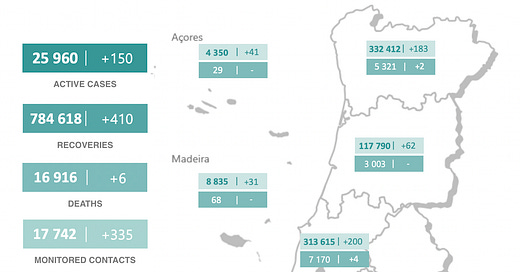Former PM to stand trial but corruption charges dropped // AstraZeneca vaccine not recommended for under-60s
Portuguese news in English on Sunday, April 11, 2021.
By the numbers
You’ll see from the chart below that after weeks of falling, the number of new cases is ticking up ever so slightly, since about April 5 in the case of the 14-day average. Fortunately the number of deaths is still dropping and hospitalisations are way below the danger zone. In worse news, the South African variant appears to be spreading t…
Keep reading with a 7-day free trial
Subscribe to Portugal Weekly to keep reading this post and get 7 days of free access to the full post archives.




